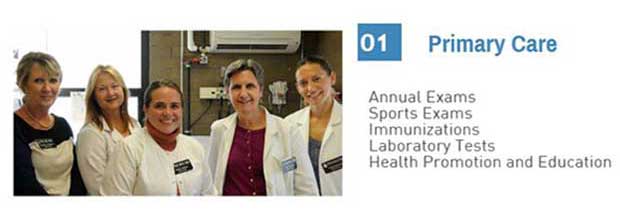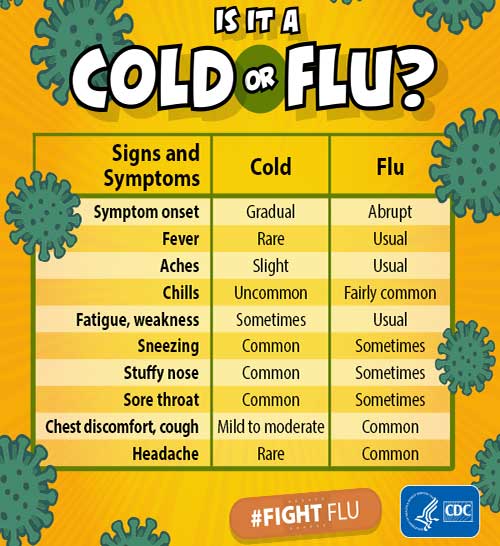Health Services

The mission of Rhode Island College Health Services is to provide confidential and holistic primary health care to enhance the academic potential of our students.
Each student encounter is an opportunity to educate about prevention and risk reduction to promote life-long healthy choices. Health Services is committed to providing high quality, accessible and cost effective services in a non-judgmental atmosphere that values diversity and respects individuality.
COVID-19 Student Report Form
Consistent with guidance from the Centers for Disease Control, state and local officials Rhode Island College has implemented a tool for faculty and staff to report students with a suspected or confirmed case of COVID-19.
Should a faculty or staff member learn of a student with a suspected or confirmed case of COVID-19 the student should be informed
NOT to come to campus unless or until cleared through Health Services. It is requested that you:
- Ask the student to remain off campus.
- Ask the student to contact Health Services.
-
Complete this form so that Health Services may be notified and follow up, as appropriate, with the student.
Call for a Telemedicine Visit
If you have a health concern or question, we are offering telemedicine visits with medical providers. If during the visit it is determined that you need to be seen in the office, we will schedule an in-office visit. This service is available to ALL RIC students in an attempt to address health and wellness needs but also conserve the use of masks and other protective gear. Our goal is to be here for you during this crisis so please call with questions or concerns.
Office Hours
|
Monday - Friday |
8:30 a.m. - 5 p.m. |
Phone: (401) 456-8055
|
Fax: (401) 456-8890 |
Information regarding:
Influenza Update
Meningococcal Disease
PrEP: Pre-exposure Prophylaxis to Prevent HIV
National Investigation into Vaping and Lung Injury
Update: Coronavirus (COVID-19)
Rhode Island College is closely following the most current information and guidelines regarding this outbreak, including specific guidelines laid out for college campuses across the country according to the CDC and the Rhode Island Department of Health. For the most recent recommendations regarding this illness and regarding any travel plans, please refer to the following links:
State Department Travel Advisories: https://travel.state.gov/content/travel/en/traveladvisories/traveladvisories.html
CDC Department Travel Advisories:https://wwwnc.cdc.gov/travel/notices
CDC COVID 19 Information:https://www.cdc.gov/coronavirus/2019-ncov/index.html
World Health Organization (WHO) COVID 19 Information: https://www.who.int/emergencies/diseases/novel-coronavirus-2019
CDC Coronavirus Disease Fact Sheets:https://www.cdc.gov/coronavirus/2019-ncov/downloads/2019-ncov-factsheet.pdf
CDC - Caring for Yourself at Home:
https://www.cdc.gov/coronavirus/2019-ncov/if-you-are-sick/caring-for-yourself-at-home.html
CDC - What To Do if You Are Sick:
https://www.cdc.gov/coronavirus/2019-ncov/if-you-are-sick/steps-when-sick.html?CDC_AA_refVal=https%3A%2F%2Fwww.cdc.gov%2Fcoronavirus%2F2019-ncov%2Fabout%2Fsteps-when-sick.html
We always recommend that students embrace the following health safety practices:
- Frequently clean hands with soap and water or alcohol-based hand sanitizer;
- Cough or sneeze into a flexed elbow or tissue. Throw the tissue away immediately and wash hands;
- Don’t share drink containers, utensils or other personal use items;
- Avoid close contact with anyone who is sick or has a fever and cough;
- Do not travel if you are sick. If you have a fever, cough and/or difficulty breathing, seek medical care.
One of the most important messages for us to remember is that someone's nationality alone is not a risk factor for coronavirus. "Someone's risk for 2019 novel coronavirus is closely tied to their recent travel history, and the travel histories of their immediate contacts—specifically, travel to mainland China or close contact with a person confirmed to have 2019 novel coronavirus." There are steps we can take to support our families’ mental and physical health during an infectious disease outbreak. The Center for the Study of Traumatic Stress at the Uniformed Services University offers guidance for talking to your children about the novel coronavirus and emergency preparedness. This resource can be found at:
Taking Care of Your Family During Coronavirus and Other Emerging Infectious Disease Outbreaks
Influenza Update
(Call Health Services about getting your flu shot!)
Dear Faculty, Staff and Students,
In the past week, several Influenza B cases have been confirmed on the RIC campus. In order to reduce the spread, students are reminded to:
- Be vigilant about handwashing
- Cover your nose and mouth when you cough or sneeze
- Avoid touching your eyes, nose, and mouth
- Avoid close contact with those who are sick
- Get a seasonal flu vaccine – it’s not too late! Free vaccine is available in Health Services – call 456-8055 for an appointment
Influenza (Flu) Symptoms:
The influenza illness can include any or all of the following symptoms:
- Fever (100 degrees or above) or feeling feverish/chills
- Dry cough
- Sore throat
- Runny or stuffy nose
- Muscle or body aches
- Headaches
- Fatigue
- Vomiting and diarrhea (more common in children than adults)
On-campus students who are experiencing influenza-like symptoms should remain in their rooms, check their temperature, and contact
Student Health Services at 401-456-8055. A staff member will assist students in following the appropriate influenza protocol.
If you live off-campus, stay home from class and contact your primary care provider for instructions; if RIC Health Services is your PCP, please call the office for instructions.
If you have been exposed to Influenza, please call Health Services or your primary care provider to discuss prevention and
antiviral therapy.
For those with Influenza: If diagnosed with influenza, Health Services has a “flu kit” available that contains: masks, disposable thermometers, OTC medications to be used as needed to help with symptoms, and information about the flu with self-care measures.
If diagnosed with influenza, students should:
- Make arrangements to go home if able or self-isolate in their room until free of fever for 24 hours
- Call Health Services daily (401-456-8055) and report fever and health status
- Call Health Services or your PCP to discuss if
antiviral therapy may be indicated for yourself and your close contacts, including suitemates.
- Get extra rest, good nutrition, and lots of fluids (water, juice, PowerAde and Gatorade are best)
- Notify RA if extra help is needed in the residence halls
- Email professors to let them know you will be out of class
- Find a friend or roommate to bring meals or food to your room from the dining hall
- Inform roommates to call Health Services if they have a chronic health condition such as asthma, diabetes, a heart condition or immunosuppression
The Centers for Disease Control (CDC) and RI Department of Health recommend that people with influenza-like illness remain at home/out of the classroom until at least 24 hours after they are free of fever (100) or signs of a fever without the use of fever reducing medications. If you have a pre-existing health condition, such as chronic respiratory issues (like asthma), diabetes, a heart condition, or immunosuppression, call Health Services or your primary care provider immediately.
The CDC has published additional information online about the flu and antiviral drug treatment.
Emergency Warning:
If you develop a high fever, difficulty breathing, shortness of breath, pain or pressure in the chest or abdomen, sudden dizziness, severe or persistent vomiting or diarrhea, neck stiffness or rash, confusion or if flu-like symptoms improve but then return with high fever and worse cough, you should seek medical attention as soon as possible.
What is the difference between a cold and flu?
Information from the Centers for Disease Control (CDC)

Meningococcal Disease
Please call RIC Health Services to learn about where you can receive your meninigitis vaccines. There are
TWO vaccines that fight against different strains of this disease:
Meningitis B Vaccine
AND the
Menactra vaccine. These vaccines are strongly recommended for all students. Menactra is a mandatory vaccine for all residential students.
Meningococcal disease can refer to any illness caused by the type of bacteria called Neisseria meningitidis, also known as meningococcus. These illnesses are often severe and include infections of the lining of the brain and spinal cord (meningitis) and bloodstream infections (bacteremia or septicemia). Meningococcal disease is treatable with antibiotics, but quick
medical attention is extremely important. It Can mimic the symptoms of influenza. Possible signs and symptoms in anyone older than the age of 2 include:
- Sudden high fever
- Stiff neck
- Severe headache that seems different than normal
- Headache with nausea or vomiting
- Confusion or difficulty concentrating
- Seizures
- Sleepiness or difficulty waking
- Sensitivity to light
- No appetite or thirst
- Skin rash (sometimes, such as in meningococcal meningitis)
Transmission: Meningococcal disease is contagious, and is generally transmitted through direct exchange of respiratory and throat secretions by close personal contact, such as coughing, sharing drinks, kissing and being in close proximity for an extended period. Fortunately, none of the bacteria that cause meningococcal disease are as contagious as the common cold or the flu, and they are not spread by casual contact or by simply breathing the air where a person with the disease has been.
Resources:
https://www.cdc.gov/meningitis/index.html
https://www.cdc.gov/vaccines/vpd/mening/public/index.html
"If I had a meningitis vaccine when I was younger, do I still need a Meningitis B vaccine?"
Most likely. Meningitis B is NOT the same meningitis that most children are vaccinated against as adolescents.
"Have there been outbreaks of Meningitis B?"
While outbreaks of Meningitis B are rare, they are very serious. Between 2013 and 2015, there were four outbreaks of Meningitis B disease reported on US college campuses. These ultimately led to two deaths.
https://meningitisbactionproject.org/download-resources
PrEP to Prevent HIV: Call Health Services to learn more. (401) 456-8055
Pre-exposure prophylaxis (or PrEP) is when people at risk for HIV take daily medicine to prevent HIV. PrEP can stop HIV from taking hold and spreading throughout your body. When taken daily, PrEP is highly effective for preventing HIV from sex or injection drug use. "Studies have shown that PrEP reduces the risk of getting HIV from sex by about 99% when taken daily. Among people who inject drugs, PrEP reduces the risk of getting HIV by at least 74% when taken daily."
https://www.cdc.gov/hiv/risk/prep/

